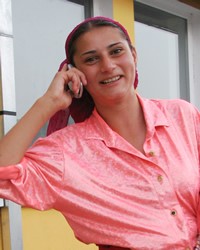Romani, Iranian in Iran

Photo Source:
Petar Milošević - Wikimedia
Creative Commons
|
Send Joshua Project a map of this people group.
|
| People Name: | Romani, Iranian |
| Country: | Iran |
| 10/40 Window: | Yes |
| Population: | 1,710,000 |
| World Population: | 1,896,600 |
| Primary Language: | Persian, Iranian |
| Primary Religion: | Islam |
| Christian Adherents: | 0.06 % |
| Evangelicals: | 0.05 % |
| Scripture: | Complete Bible |
| Ministry Resources: | Yes |
| Jesus Film: | Yes |
| Audio Recordings: | Yes |
| People Cluster: | Domari |
| Affinity Bloc: | Persian-Median |
| Progress Level: |
|
Introduction / History
Romani or Domari, are made up of two groups: the Ghorbati and the Nawari. Both groups speak a dialect of the language called Romany, which is related to the North Indo-Aryan language of India. Their dialect, Domari, contains many Arabic words.
Romani call themselves Rom, which in their language means "men." Rom is derived from the Indian word Dom, meaning "a man of low caste who gains his livelihood by singing and dancing."
Romani originated in India where they worked as musicians, entertainers, and metal workers. There they were discriminated against and excluded from the temples. Later, they were sent to Persia as minstrels. From there they were separated into two groups. One traveled northward and became the Romany-speaking European Romani. The other traveled southward and became known as the Domari, or Middle Eastern Romani. A high percentage of them settled in Iran.
What Are Their Lives Like?
Dark skin and dark eyes are typical of most Romani. Their almost "mystical" lifestyle has made them the objects of curiosity, distrust, and even fear, from their beginnings until now.
The Romani live scattered throughout much of the world. Many are nomads, wandering from region to region, and they depend on a variety of entrepreneurial skills for their livelihood. It is common for Romani to have two or more specialized occupations. This makes it easier for them to adapt to a changing society's needs. When a region's people no longer need a Romani's particular skill, they move on to one that will.
Romani have long been known for their abilities as musicians, singers and dancers. They also hold a wide variety of other occupations. The men are skilled makers of sieves, drums, bird cages, and reed mats. They also entertain with animals, work as tinkers, or play music. The women sometimes sell such things as cloth, shoes, kitchen utensils or other products made by Romani men. Many also sing and dance. Both men and women shear sheep, spin wool, and tell fortunes.
There are Romani villages and communities in Iran. Some live in the cities and have become an integral part of urban life. Other Romani are nomadic and either travel in caravans of wagons or carts, or they ride on camels, donkeys or horses. The settled Romani usually live in houses that are typical to those of the region in which they settle.
Romani marriages usually take place between couples in their teens. The Romani family unit is highly valued and each member is depended on for his financial contribution.
Values such as justice, fidelity and morality are very significant in Romani society. Such things as courtesy and friendliness are also very important.
The control of deviants is strictly enforced. If a Romani becomes impure by some immoral or unlawful act, he is considered an outcast. Also, sexual purity is considered a must for young women. In fact, it must be proven before marriage that the girl has never before been with a man.
What Are Their Beliefs?
Romani in Iran are Muslim and they follow the practices and beliefs of the Islamic faith. The traditional beliefs of the Romani such as that ghosts, lizards, and snakes are capable of harming humans, that men have the power to curse others by giving them the "evil eye," and that some people have the power to heal the sick are no longer held by most Romani. There are a growing number of Christian Romani.
What Are Their Needs?
The quality of health care, nutrition, housing and education is poor. Adequate educational opportunities must be provided in order to raise their standard of living.
Spiritually, the Islamic religion is very difficult to influence. Their nomadic lifestyle has also made it difficult for missionaries to reach them. Christian broadcasts and Scriptures must be made available if they are to hear the gospel.
Prayer Points
Ask the Lord to call people who are willing to share Christ with the Romani.
Ask the Lord to raise up multiplying fellowships of believers among the Romani.
Ask God to strengthen, encourage, and protect the small number of Romani Christians.
Pray that those Romani who know Christ will be bold witnesses of the Gospel to their own people.